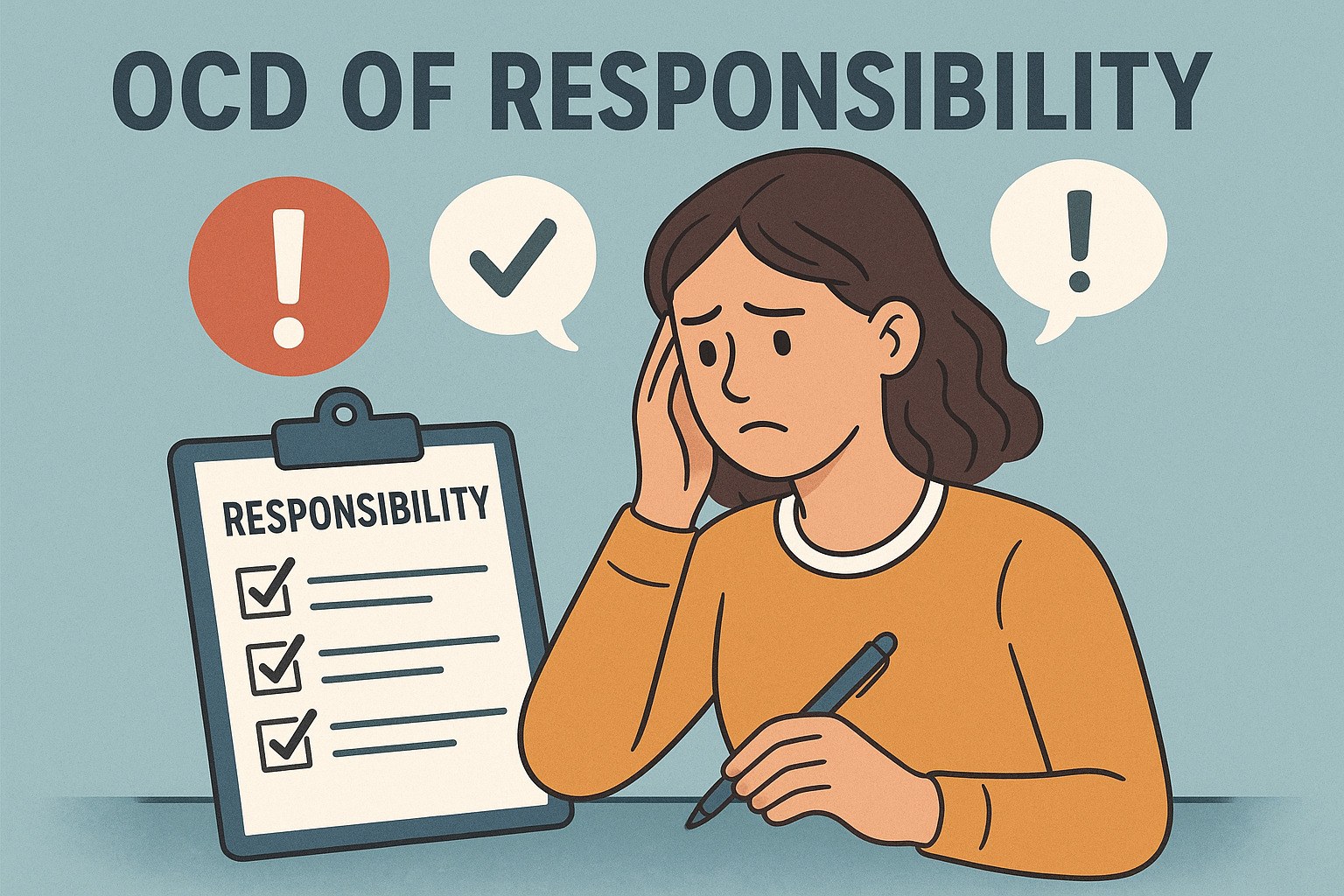OCD of Responsibility, some people carry more than just their share of daily responsibilities; they carry a deep and constant fear of causing harm, even when they’ve done nothing wrong. For those living with responsibility-focused OCD, life becomes a series of self-checks, doubts, and guilt over things they cannot control. It’s not about being overly careful—it’s about living with an invisible pressure that won’t let go.
This article, prepared by Emotion of Life under the guidance of OCD Specialist Therapist Shyam Gupta and female OCD therapist Pratibha Gupta, explores what it feels like to live with this experience, how it affects everyday life, and how support through Cognitive Behaviour Therapy (CBT) and Exposure and Response Prevention (ERP) can make a meaningful difference.
OCD of Responsibility – Signs, Causes & Treatment
Some people carry more than their share of daily responsibilities. For those with responsibility-focused OCD, life is marked by fear of causing harm, constant self-checks, and persistent guilt. At Emotion of Life, therapists Shyam Gupta and Pratibha Gupta guide clients to recovery with non-medication therapies like CBT and ERP.
What Does OCD of Responsibility Feel Like?
People with this condition experience ongoing intrusive worries about responsibility, even in harmless situations. These fears create distress and self-doubt, despite knowing they may not be logical.
- Checking doors repeatedly to protect loved ones.
- Avoiding actions for fear of accidental harm.
- Mentally reviewing conversations to avoid offense.
A Glimpse into Anya’s Life
Anya, a caring young woman, lived with constant guilt over others’ experiences. She over-apologised, avoided social situations, and sought reassurance. The more she tried to prevent harm, the more trapped she felt. With support from Emotion of Life, she sought recovery to reclaim her life.
Causes of OCD of Responsibility
- Past OCD experiences increasing fear of relapse.
- Stressful life events such as loss or major changes.
- Personality traits like perfectionism or hyper-awareness.
- Learned fears from exposure to harm-related events.
- Social influences and reinforcement from media or peers.
Signs and Symptoms
Emotional and Mental
- Persistent worry about mistakes or harm.
- Checking thoughts for “OCD patterns.”
- Entrapment in “what if” loops.
- Overwhelming guilt and self-doubt.
- Anxiety linked to responsibility thoughts.
Behavioral
- Repeatedly researching OCD online.
- Reassurance-seeking from others.
- Avoiding responsibility-related situations.
- Over-monitoring emotions.
- Frequent apologies or checking behaviors.
Impact on Daily Life
- Difficulty trusting memory.
- Strained relationships.
- Sleep disturbances from racing thoughts.
- Reduced confidence and self-worth.
Common Thought Patterns
- “What if I did something wrong and don’t remember?”
- “If I don’t check, something bad might happen and it’ll be my fault.”
- “I must be a bad person to think like this.”
- “I need to be 100% sure I didn’t hurt anyone.”
Treatment at Emotion of Life
Emotion of Life provides a structured, therapy-driven approach without medication.
Cognitive Behavioural Therapy (CBT)
Challenges unrealistic responsibility beliefs and restructures thoughts.
Exposure and Response Prevention (ERP)
Gradually reduces compulsive checking and reassurance-seeking.
Uncertainty Tolerance Training
Builds resilience to accept life without absolute certainty.
Confidence Rebuilding
Restores trust in memory, decisions, and balanced judgment.
Family Guidance
Trains families to reduce reassurance and give healthy support.
16-Step OCD Recovery & Cure Program
- Initial Assessment & Understanding
- Psychoeducation
- Identifying Responsibility Triggers
- Thought Awareness Training
- Personalised Recovery Roadmap
- Cognitive Restructuring
- ERP Preparation
- ERP Implementation
- Uncertainty Acceptance Training
- Emotional Regulation Skills
- Breaking the Reassurance Cycle
- Confidence & Self-Trust Building
- Relapse Prevention Strategies
- Lifestyle & Wellness Coaching
- Family & Relationship Guidance
- Graduation to OCD-Free Living
Conclusion
OCD of Responsibility can be overwhelming, but it is highly treatable. With therapy at Emotion of Life, clients learn to challenge intrusive thoughts, reduce compulsions, and rebuild confidence. Through the structured 16-step program, recovery without medication is possible, helping individuals live fully again.
What is OCD of Responsibility?
What are common symptoms OCD of Responsibility?
How is OCD of Responsibility treated at Emotion of Life?
Can OCD of Responsibility be fully cured?
How long does recovery from OCD of Responsibility take?
Why Choose Emotion of Life?
Over 24 years of expertise in OCD recovery.
Daily therapy sessions (online & onsite in Agra).
Zero medication approach — CBT + ERP + Wellness Coaching.
Led by Shyam Gupta (OCD Specialist Therapist) and Pratibha Gupta (female OCD therapist).
Thousands of global client success stories proving that OCD cure is possible.
Take the first step today with the OCD Recovery & Cure Program at Emotion of Life.



